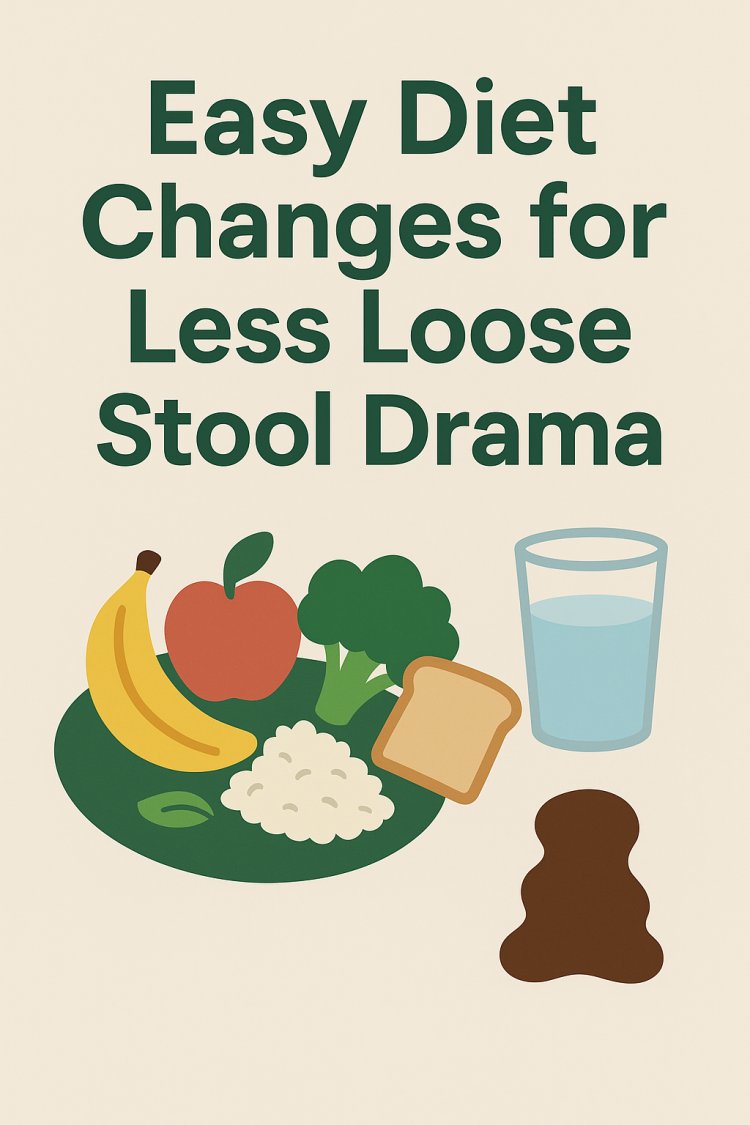Easy Diet Changes for Less Loose Stool Drama
Digestive troubles are something most of us experience at some point, but few like to talk about openly. Loose stools, urgency, and irregular bowel movements can disrupt your day, make travel stressful, and even interfere with your confidence in professional or social situations.

Digestive troubles are something most of us experience at some point, but few like to talk about openly. Loose stools, urgency, and irregular bowel movements can disrupt your day, make travel stressful, and even interfere with your confidence in professional or social situations. While severe or persistent symptoms should always be evaluated by a healthcare professional, many cases of loose stool can be significantly improved with simple dietary adjustments.
In this guide, we will explore easy, practical diet changes that can help you regain control over your digestion, along with supportive strategies. We’ll also highlight how medical treatment, including products from a reliable nizonide supplier, may sometimes be necessary if parasites or infections are the underlying cause.
Why Loose Stools Happen
Loose stools can result from a variety of factors, including
- Dietary choices: Too much caffeine, alcohol, artificial sweeteners, or high-fat meals.
- Food intolerances: Lactose, gluten, or other sensitivities.
- Infections or parasites: Bacterial, viral, or protozoal pathogens that upset the gut balance.
- Medication side effects: Antibiotics, certain supplements, or other drugs that irritate the digestive tract.
- Gut disorders: Conditions like irritable bowel syndrome (IBS), inflammatory bowel disease (IBD), or celiac disease.
Since the triggers can be diverse, small changes in your diet are often the first and most effective step toward restoring balance.
1. Prioritize the BRAT Diet When Needed
When you’re experiencing acute loose stools, the BRAT diet (bananas, rice, applesauce, toast) can help. These foods are:
- Bland and gentle on the stomach
- Low in fiber, which helps firm up stools
- Easy to digest
Other simple additions include boiled potatoes, plain crackers, and clear broths. This is not a long-term eating plan, but a short-term tool to stabilize digestion.
2. Add More Soluble Fiber
Fiber often gets blamed for digestive problems, but the right kind of fiber can actually calm your gut. Soluble fiber absorbs water in the intestines, creating bulk and slowing down diarrhea.
- Foods rich in soluble fiber include
- Oats
- Carrots
- Apples and pears (without skins)
- Psyllium husk (often sold as fiber supplements)
- Gradually increase intake so your system adjusts without extra gas or bloating.
3. Stay Hydrated the Smart Way
Loose stools deplete the body of fluids and electrolytes. Drinking water alone may not be enoughyou need to replace lost salts as well.
- Sip on oral rehydration solutions (ORS) if you have multiple episodes in a day.
- Coconut water, broth-based soups, and diluted fruit juices are also useful.
- Avoid sugary sodas or very sweet juices, which can worsen diarrhea.
4. Limit Trigger Foods
Certain foods can trigger or worsen loose stools. Consider keeping a food diary to identify your personal culprits. Common offenders include
- Spicy foods
- Fried or greasy meals
- Artificial sweeteners (sorbitol, mannitol, xylitol)
- Excess caffeine (coffee, energy drinks, soda)
- Alcohol
- Reducing or eliminating these can make a big difference in bowel regularity.
5. Reintroduce Probiotic Foods
Your gut contains billions of bacteria, and loose stools can throw that balance off. Probiotic foods help restore healthy bacteria and reduce digestive upset.
Examples include
- Yogurt with live cultures
- Kefir
- Sauerkraut
- Kimchi
- Miso soup
If your stomach is sensitive, introduce these foods gradually. Alternatively, probiotic supplements may also help.
6. Watch Out for Lactose Intolerance
Many adults develop lactose intolerance over time, which means dairy products can lead to cramping and diarrhea. If you notice your symptoms worsen after milk, ice cream, or cheese, try lactose-free alternatives or plant-based substitutes such as almond or oat milk.
7. Eat Smaller, More Frequent Meals
Large, heavy meals can overwhelm your digestive system, leading to looser stools. Instead, try eating 5–6 smaller meals per day, which are easier for your body to process and absorb.
8. Consider the Role of Infections and Medication
Sometimes, loose stools are not just about diet. Intestinal infections, including parasitic ones, may be to blame. In such cases, dietary adjustments alone won’t solve the problem you’ll need proper medication.
This is where nizonide suppliers come in. Nizonide (nitazoxanide) is often prescribed for parasitic infections like Giardia lamblia or Cryptosporidium parvum, which are common causes of persistent diarrhea worldwide. By sourcing the medication from a trusted nizonide supplier, patients can ensure safe and effective treatment when prescribed by their doctor.
9. Keep a Symptom Journal
If you’re unsure about your triggers, keeping a food and symptom diary can be eye-opening. Record:
- What you ate and drank
- The time you experienced symptoms
- Stress levels or other factors
- After a few weeks, patterns often emerge, helping you pinpoint the problem foods or habits.
10. Know When to Seek Medical Help
While dietary changes work for many, don’t ignore warning signs. Seek medical attention if you have:
- Persistent diarrhea lasting more than a week
- Blood or mucus in the stool
- Severe abdominal pain or cramping
- Fever or unexplained weight loss
- Signs of dehydration (dizziness, dry mouth, dark urine)
- Sometimes, tests are needed to identify underlying infections or chronic conditions.
Final Thoughts
Loose stools don’t have to control your life. With simple changes like adding soluble fiber, staying hydrated, limiting trigger foods, and incorporating probiotics you can often bring your digestion back into balance. However, if infections or parasites are involved, dietary strategies need to be combined with medical treatment.
That’s where consulting your healthcare provider and working with a reliable nizonide supplier can make the difference, ensuring you get safe access to the right medication.
By being proactive with both your diet and your medical care, you can reduce the drama of loose stools and regain comfort, energy, and confidence in daily life.


 drelizabethblackburn
drelizabethblackburn 



















